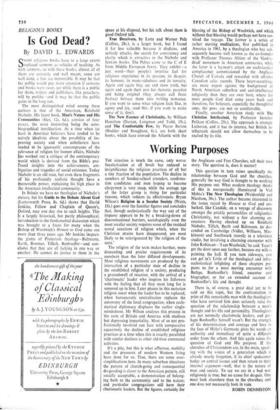Is God Dead?
RELIGIOUS BOOKS
By D \\ 11) L. EDWARDS
HORT religious books have to a large extent a replaced sermons as vehicles of teaching. As with sermons, so with these books; almost all of them are seriously and well meant, some are well done, a few are memorable. It may be that the public would pay more attention if sermons and books were rarer, yet while there is a public for them, writers and publishers, like preachers, will be prolific—and it may be that the public gains in the long run.
The most distinguished mind among these authors is that of the American, Reinhold Niebuhr. His latest book, Man's Nature and His Communities (Bles, 12s. 6d.), consists of four essays, the most interesting being the auto- biographical intrdduction. At a time when (at least in America) believers have tended to be naively idealistic about the possibility of im- proving society and when unbelievers have tended to be ignorantly contemptuous of the relevance of religion for human affairs, Niebuhr has worked out a critique of the contemporary world which is derived from the Bible's pro- found insights into the achievements, am- biguities and tragedies of social existence. Today Niebuhr is an old man, but even these fragments of his profoundly realistic thought have a tttemorable power, explaining his high place in the American intellectual community.
In Britain we have no theologian of Niebuhr's stature, but his Guide to the Debate About God (Lutterworth Press, 8s. 6d.) shows that David Ienkins, Fellow and Chaplain of Queen's, Oxford, may one day rise to such heights. This Is a largely historical, but partly philosophical, Introduction to the fundamental discussion which was brought to a focus for many when the Bishop of Woolwich's Honest to God came out more than three years ago. Mr Jenkins inspects the giants of Protestant theology—Bultmann, Barth, Brunner, Tillich, Bonhoeffer—and con- cludes that they are all lacking in one way or another. He cannot do justice to them in the
space at his disposal, but his talk about them is good Oxford talk.
True Deceivers, by Lotte and Werner Pelz (Collins, 28s.), is a larger book, but I found it far less valuable because it disdains, and actively attacks, the search for consistency and clarity which is attractive in the Niebuhr and Jenkins books. The Pelzes came to the C of E from Middle European Jewry. They exhibit—a just word—their people's intuitive feel for religious experience in its passion, its despair, its humour, its many-sidedness and its tenacity. Again and again they see and show truth, but again and again their zest for rhetoric, paradox and being original (they always call Jesus Joshua) betrays them into writing nonsense. If you want to sense what religion feels like, in agony and joy, read this; if you want to make sense of it, don't.
The New Essence of Christianity, by William Hamilton (Darton, Longman and Todd, 15s.), and The Comfortable Pew, by Pierre Berton (Hodder and Stoughton, 6s.), are both short books, which have crossed the Atlantic with the blessing of the Bishop of Woolwich, and which without that blessing would perhaps not have sur- vived the voyage. The former is a series of rather moving meditations, first published in America in 1961, by a theologian who has sub- sequently become well known as the co-founder with Professor Thomas Altizer of the 'God-is- dead' movement in American seminaries, while the latter is a layman's attack on ecclesiastical complacency commissioned by the Anglican Church of Canada and rewarded with all-time Canadian sales records. These heart-searching; are more urgent against the background of North American suburban and anti-intellectual religiosity than they are over here, where for most people God died some years back and therefore, for believers, especially the thoughtful ones, the pews are not so comfortable.
Finally, another American study with The Christian Intellectual, by Professor Jaroslav Pelikan (Coffins, 251.). The approach is strongly Lutheran, and it has its interest, but British in- tellectuals should not allow themselves to be excited by its title.


































 Previous page
Previous page